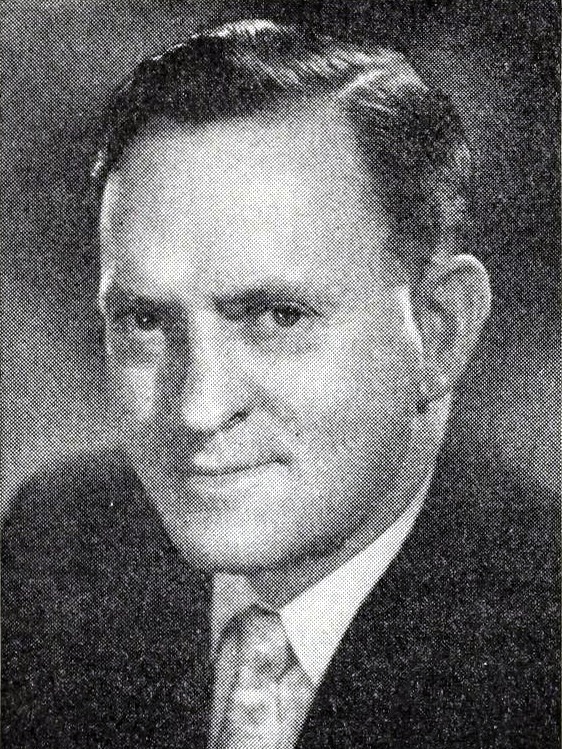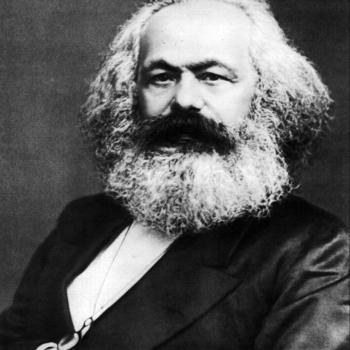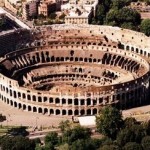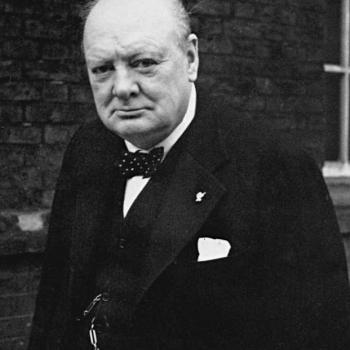[This is another addition to our ongoing General Conference Odyssey — which project you can also check out via our facebook page. To learn a little about the reasons which motivated this project, you can visit this article at Meridian Magazine.]
Anyone looking for a paradigmatic example of what might be called the “Whig-LDS view of history” need look no further. It is here in Brother Alvin R. Dyer’s “The Last Dispensation.” The Whig view of history is a kind of class progressive and triumphalist understanding of the West, which peaked before World War. It is a very linear view, according to which things get better and better in the history of the West, at least if one starts with the “Dark Ages,” until they reach their perfection in… well, us. In a LDS context, this yields the familiar story Apostasy ⇒ Dark Ages ⇒Renaissance ⇒Reformation ⇒Restoration ⇒Us.
But there’s no need for me to interpret and summarize; here it is right here from Brother Dyer in its pure form:
From the dark ages, that period of time following the death of the apostles of the Lord in the meridian dispensation—which continued for about eleven hundred years, during which time there was no intelligent glorification of the individual—hardly a painted picture emerged that portrayed this important concept. Everything was lost in relentless subjection of the masses to the evil power of unrighteous dominion.
Then came that period known as the Renaissance, which gave to men an inward longing for liberation of thought with the courage to face the evil forces that held them in subjection. Man again began to seek for freedom and truth. The Master of men had said many years before, “… ye shall know the truth, and the truth shall make you free.” (John 8:32.) But this and other scripture, for many years, they had not even been privileged to read.
But God began to work with men, and their hearts turned toward him; and whenever the spark of freedom was found, it was influenced and fed by the natural forces of agency. Soon the desire for freedom, matched with the courage to fight and die for it, spread among men.
The question might well be asked, Why does freedom need to be restored as a forerunner to a new dispensation of the gospel of Jesus Christ? The answer is a simple one, for well the Lord knows that without the spirit of freedom in the souls of men, there could be no willing response to the gospel plan. For it is in the culture of freedom and the use of agency in that freedom that men come to know the difference between good and evil. This progress leads to yearnings in the hearts of good men, and eventually to gospel dispensations. This is the pattern to be noted down through the era of the historical writings.
The continued longing for freedom led directly to the period known as the Reformation, which led to the foundation of America and the framing of the Constitution, concerning which the Lord has said:
“According to the laws and constitution of the people, which I have suffered to be established, and should be maintained for the rights and protection of all flesh, according to just and holy principles.” (D&C 101:77.)
All of this in its proper order leads directly to the greatest period in the experience of man upon the earth, a new dispensation of the gospel of Jesus Christ.
Of course there is truth to be found in this view, as there is in most simplifications. Certain it is, for example, that the preparation of the settlements of North America for a people who would be governed by the U.S. Constitution, and thus everything that contributed to that preparation, was an indispensable prelude to the Restoration. But the simple linear tale is in some key respects profoundly misleading. For example, the theology of Thomas Aquinas (in Dyer’s theory, I suppose, the leading thinker of Darkness), is in fact much friendlier in its essential principles to human agency, and much closer to consonance with LDS beliefs, than the radical denial of free will we find in Martin Luther and in John Calvin. As for the Renaissance, we might just ask: if Machiavelli is considered a key figure of the Renaissance (and he would seem to be the most influential thinker of that time period), then must we consider him positively as a forerunner of the Restoration of the Gospel of Jesus Christ? This doesn’t work.
The fundamental problem with the linear, Whig view is the assumption of a fundamental concord between moral-religious progress and the expansion of individualist or secular “freedom,” along with its partner, technological power. In the nineteenth century this was still a very appealing story, at least for those ready to overlook the moral destructiveness of the French Revolution as an aberration. But authors such as Alexis de Tocqueville had already understood that the march of Democracy and the Rights of Humanity, emancipated from the moral limits of religion and tradition, in fact threatened moral agency and thus the very meaning of humanity. 20th century totalitarianism lies at the end of the golden path that Brother Dyer so confidently traces.
Elder Ezra Taft Benson (“Civic Standards for the Faithful Saints”) relies not on such a triumphalist historical understanding but much more soberly on dedication “to the Constitution in the tradition of our Founding Fathers” (my emphasis). This appeal to tradition is not merely pious or sentimental, but on a circumspect view of human nature, a view supported as much by reason as by Scripture:
The Lord said that “the children of this world are in their generation wiser than the children of light.” (Luke 16:8.) Our wise founders seemed to understand, better than most of us, our own scripture, which states that “it is the nature and disposition of almost all men, as soon as they get a little authority … they will immediately begin to exercise unrighteous dominion.” (D&C 121:39.)
To help prevent this, the founders knew that our elected leaders should be bound by certain fixed principles. Said Thomas Jefferson: “In questions of power then, let no more be heard of confidence in man but bind him down from mischief by the chains of the Constitution.”
These wise founders, our patriotic partners, seemed to appreciate more than most of us the blessings of the boundaries that the Lord set within the Constitution, for he said, “And as pertaining to law of man, whatsoever is more or less than this, cometh of evil.” (D&C 98:7.)
In God the founders trusted, and in his Constitution—not in the arm of flesh. “O Lord,” said Nephi, “I have trusted in thee, and I will trust in thee forever. I will not put my trust in the arm of flesh; … cursed is he that putteth his trust in man or maketh flesh his arm.” (2 Ne. 4:34.)
President J. Reuben Clark, Jr., put it well when he said:
“God provided that in this land of liberty, our political allegiance shall run not to individuals, that is, to government officials, no matter how great or how small they may be. Under His plan our allegiance and the only allegiance we owe as citizens or denizens of the United States, runs to our inspired Constitution which God himself set up. So runs the oath of office of those who participate in government. A certain loyalty we do owe to the office which a man holds, but even here we owe just by reason of our citizenship, no loyalty to the man himself. In other countries it is to the individual that allegiance runs. This principle of allegiance to the Constitution is basic to our freedom. It is one of the great principles that distinguishes this ‘land of liberty’ from other countries.” (Improvement Era, July 1940, p. 444.)
We are all progressives now, quite sure that in our political and social views we have moved far beyond the ideas of our Church leaders of a generation or two ago, so we are inclined to find quaint any warnings from 1972 or from 1950:
The warning of President Joseph Fielding Smith is most timely: “Now I tell you it is time the people of the United States were waking up with the understanding that if they don’t save the Constitution from the dangers that threaten it, we will have a change of government.” (Conference Report, April 1950, p. 159.)
But have we really outgrown the need for limited government based on firm constitutional principles? If we think we have, have we then already experienced the “change of government” warned against here? If we don’t believe we are hanging by a thread, then… well, maybe there’s no thread.
…………………
Elder Robert L. Simpson makes the case for “Courts of Love.” In doing so he reminds us that now is the time to repent, and that “it will never be easier than … right here in this mortal sphere.”
Be not disillusioned by doctrine of the adversary that there will likely be a magic point in eternity when all of a sudden selfish and improper actions are automatically eliminated from our being. Holy writ has confirmed time and time again that such is not the case, and prophets through the ages have assured us that now is the time to repent, right here in this mortal sphere. It will never be easier than now; and returning to Brother Talmage’s thought, he who procrastinates the day or hopes for an alternate method that might require less courage waits in vain, and in the meantime, the possibilities grow dimmer. He is playing the game as Satan would have him play it, and exaltation in the presence of God grows more remote with each passing day.
I am reminded of these verses from Alma 34:
32 For behold, this life is the time for men to prepare to meet God; yea, behold the day of this life is the day for men to perform their labors.
33 And now, as I said unto you before, as ye have had so many witnesses, therefore, I beseech of you that ye do not procrastinate the day of your repentance until the end; for after this day of life, which is given us to prepare for eternity, behold, if we do not improve our time while in this life, then cometh the night of darkness wherein there can be no labor performed.
This is counsel worth emphasizing, I think, in a society that finds it soothing to sever mercy from justice, concerning ourselves and those dear to us, living and dead.
Elder Simpson ties the practice of Church discipline to the fundamental idea of law:
“And again, verily I say unto you, that which is governed by law is also preserved by law and perfected and sanctified by the same.
“That which breaketh a law, and abideth not by law, but seeketh to become a law unto itself, and willeth to abide in sin, and altogether abideth in sin, cannot be sanctified by law, neither by mercy, justice, nor judgment. Therefore, they must remain filthy still.
“All kingdoms have a law given;
“And there are many kingdoms; for there is no space in the which there is no kingdom; and there is no kingdom in which there is no space, either a greater or a lesser kingdom.
“And unto every kingdom is given a law; and unto every law there are certain bounds also and conditions.
“All beings who abide not in those conditions are not justified.” (D&C 88:34–39.)
I am reminded of the upcoming conference at Utah Valley University, April 12-13, 2016, on “Mormonism and the Art of Boundary Maintenance.” Whatever the question is, it seems to me, Elder Simpson might just have given us the answer.
………………………
Mention should be made of Elder Cullimore’s “The Importance of Personal Testimony.” Despite clear and strong counsel to the contrary[i], there is in today’s Church a wave of discussion about the problem of doubt that sometimes comes close to celebration. Elder Cullimore certainly puts the burden of questioning back on the shoulders of the seeker, and not on some supposed defect in the well-foundedness of the Lord’s Word or of his Church:
President McKay answered it: “The secret lies in the testimony, possessed by each individual who is faithful in the Church, that the Gospel consists of correct principles. …
“This testimony has been revealed to every sincere man and woman who has conformed to the principles of the Gospel of Jesus Christ, who has obeyed the ordinances, and has become entitled to and has received the Spirit of God, the Holy Ghost, to guide him.” (Pathways to Happiness [Bookcraft, 1957], pp. 314–15.)
… We need the companionship of the Spirit in our lives to continually confirm to us the divinity of the gospel plan. Two things are vital to the assurance of the companionship of the Spirit:
- Our lives must be in conformity to the gospel standards. “… the Spirit of the Lord doth not dwell in unholy temples.” (Hel. 4:24.)
- We must be engaged in the work. As the Pharisees listened to the bold teachings of the Savior, they said: “How knoweth this man letters, having never learned?” He answered them: “If any man will do his will, he shall know of the doctrine, whether it be of God, or whether I speak of myself.” (John 7:15, 17.)
I suggest that any truth-seeker ought first to review these two points when dealing with a “faith crisis.”
_______________________________________________
[i] When problems come and questions arise, do not start your quest for faith by saying how much you do not have, leading as it were with your “unbelief.” That is like trying to stuff a turkey through the beak! Let me be clear on this point: I am not asking you to pretend to faith you do not have. I am asking you to be true to the faith you do have. Sometimes we act as if an honest declaration of doubt is a higher manifestation of moral courage than is an honest declaration of faith. It is not! So let us all remember the clear message of this scriptural account: Be as candid about your questions as you need to be; life is full of them on one subject or another. But if you and your family want to be healed, don’t let those questions stand in the way of faith working its miracle. J.R. Holland, “Lord I Believe,” April 2013.
Post from others in the continuing Odyssey
- The Family, The Family, The Family (By Nathaniel Givens at Difficult Run)
- Personal Dispensation (By G at Junior Ganymede)
- Skip My Commentary and Read President Benson’s Talk (By John Hancock at the Good Report)
- Not Belief: I know It (By Silver Rain at The Rains Came Down)
- Oh, To Be Excommunicated! (By Jan Tolman at LDS Women of God)












